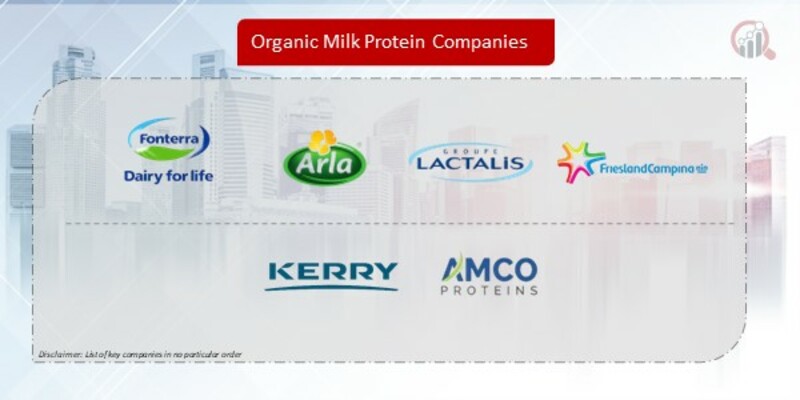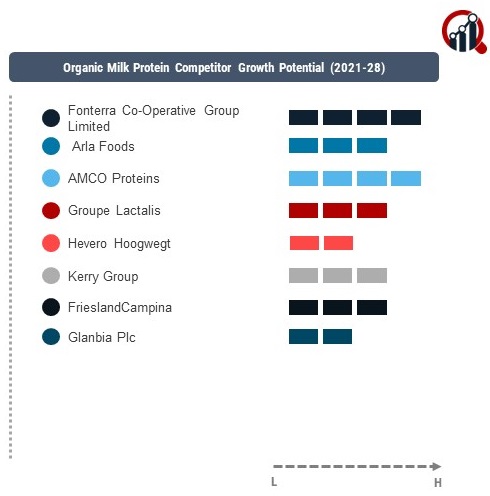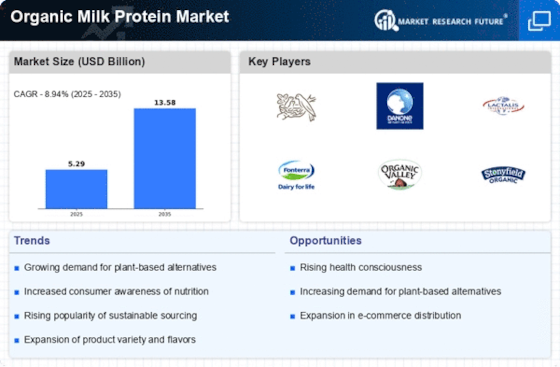Top Industry Leaders in the Organic Milk Protein Market

Strategies Adopted by Organic Milk Protein Key Players
The organic milk protein market is witnessing robust growth driven by increasing consumer awareness of the benefits of organic products and a growing demand for clean-label and natural ingredients. This analysis provides insights into the key players, strategies adopted, market share determinants, news, emerging companies, industry trends, current investment trends, and recent developments in 2023.
Key Players:
The organic milk protein market is marked by the presence of key players that are pivotal in shaping the industry landscape. These key players include:
Fonterra Co-operative Group Limited (New Zealand)
Arla Foods (Denmark)
AMCO Proteins (U.S.)
Groupe Lactalis (France)
Hevero Hoogwegt (Netherlands)
Kerry Group (Ireland)
FrieslandCampina (Netherlands)
Ganbia plc. (Ireland)
Companies in the organic milk protein market deploy various strategies to establish a competitive edge and address evolving market dynamics:
- Product Portfolio Expansion: Key players focus on expanding their product portfolios to cater to a diverse range of applications, including sports nutrition, infant formula, and functional foods.
- Partnerships and Collaborations: Strategic collaborations and partnerships with dairy farmers, processors, and distribution networks help companies strengthen their supply chain, ensuring a consistent and high-quality source of organic milk.
- Focus on Sustainability: With increasing consumer consciousness about sustainability, companies in the organic milk protein market are investing in sustainable and ethical practices in milk production and processing.
- Investment in Research and Development: Continuous investment in research and development is crucial to developing innovative organic milk protein products that meet consumer demands for taste, texture, and nutritional content.
Market Share Analysis:
Several factors influence the market share dynamics in the organic milk protein market:
- Organic Certification and Compliance: Companies adhering to stringent organic certification standards gain consumer trust, influencing their market share positively.
- Global Reach and Distribution Network: The ability to establish and maintain a robust global distribution network ensures that organic milk protein products reach a wider consumer base, contributing to market share growth.
- Quality Assurance and Traceability: Ensuring product quality and traceability throughout the supply chain is crucial for companies to maintain a favorable market share.
- Customer Relationship Management: Effective customer relationship management and responsiveness to consumer feedback contribute to building brand loyalty, positively impacting market share.
News & Emerging Companies:
Recent developments and emerging companies in the organic milk protein market signify ongoing trends and potential shifts:
- Emergence of Startups: There is a noticeable trend of startups entering the organic milk protein market, focusing on niche segments such as plant-based protein blends and specialty nutritional products.
- Clean-Label Innovations: Companies are increasingly investing in clean-label innovations, addressing consumer concerns about additives and processing methods in organic milk protein products.
Industry Trends:
Investment trends within the organic milk protein market highlight a commitment to sustainability, innovation, and addressing evolving consumer needs:
- Sustainable Sourcing Practices: Companies are investing in sustainable sourcing practices for organic milk, including support for regenerative agriculture and ethical treatment of dairy animals.
- Investment in Processing Technologies: Continuous investment in advanced processing technologies is a trend, ensuring that the nutritional integrity of organic milk proteins is maintained while meeting the demand for diverse product formats.
Competitive Scenario:
The organic milk protein market remains highly competitive, with key players leveraging their global presence, product innovation capabilities, and sustainable practices to maintain and enhance their market positions. The increasing interest from startups and niche players adds dynamism to the competitive landscape.
Recent Development
A significant development in 2023 is the increased investment by key players in sustainable sourcing practices. There is a growing emphasis on supporting regenerative agriculture and implementing ethical practices in dairy farming to ensure a long-term, environmentally responsible supply chain. This development aligns with the broader industry commitment to sustainability, reflecting the growing importance of ethical and eco-friendly considerations in consumer purchasing decisions.












